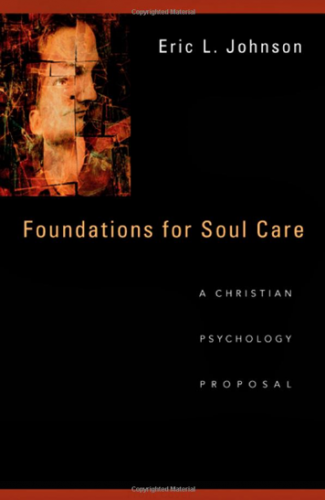
 I know, right, how could I possibly narrow it all down? Through some happily providential occurrences, I have had the pleasure of meeting Dr. Eric Johnson here in Louisville and of reading his massive tome entitled Foundations for Soul Care: A Christian Psychology Proposal. In this book, Dr. Johnson attempts to bridge the divide between secular and Christian views of psychology in a way that will allow them to speak to each other constructively. Since that is a lot of what we do here in MBird—albeit in a much less technical way—I was excited to run across this book and even more so after having finished (most of) it. I’m not much of a psychologist (although I have played one off, off, off Broadway from time to time), so I can’t really comment on some of the more technical discussions contained in the book; however, as a theologian and pastor, I can heartily recommend the theological anthropology that underlies the entire discussion of the human soul, because it takes seriously the deep and abiding tragedy that is the human being under the curse of the law. This curse, as we often point out, resulted in the entrance of guilt, fear, and shame into the world, and these are the underlying psychological wounds from which, as Dr. Johnson (rightly) explains, our neuroses and pathologies grow.
I know, right, how could I possibly narrow it all down? Through some happily providential occurrences, I have had the pleasure of meeting Dr. Eric Johnson here in Louisville and of reading his massive tome entitled Foundations for Soul Care: A Christian Psychology Proposal. In this book, Dr. Johnson attempts to bridge the divide between secular and Christian views of psychology in a way that will allow them to speak to each other constructively. Since that is a lot of what we do here in MBird—albeit in a much less technical way—I was excited to run across this book and even more so after having finished (most of) it. I’m not much of a psychologist (although I have played one off, off, off Broadway from time to time), so I can’t really comment on some of the more technical discussions contained in the book; however, as a theologian and pastor, I can heartily recommend the theological anthropology that underlies the entire discussion of the human soul, because it takes seriously the deep and abiding tragedy that is the human being under the curse of the law. This curse, as we often point out, resulted in the entrance of guilt, fear, and shame into the world, and these are the underlying psychological wounds from which, as Dr. Johnson (rightly) explains, our neuroses and pathologies grow.
 One of the great difficulties with many books on human psychology written from a purely materialistic, that is, secular, worldview, is that no matter how wonderfully descriptive they are about the nature of human psychological maladies, invariably they fail to go sufficiently deep enough in their excavation of the roots of human brokenness. In other words, they fail to take into account what the Christian tradition has labeled “sin.” Psychology, for a materialist, becomes an exercise in description without prescription, where the presupposition is that awareness of a problem or its roots is identical to the cure.
One of the great difficulties with many books on human psychology written from a purely materialistic, that is, secular, worldview, is that no matter how wonderfully descriptive they are about the nature of human psychological maladies, invariably they fail to go sufficiently deep enough in their excavation of the roots of human brokenness. In other words, they fail to take into account what the Christian tradition has labeled “sin.” Psychology, for a materialist, becomes an exercise in description without prescription, where the presupposition is that awareness of a problem or its roots is identical to the cure.
On the other hand, many Christian books that deal with the human predicament are all too ready to emphasize sin, but often have an oppositional approach to the descriptive insights of modern psychology. This approach can mire them, ironically, in a place where the problem they are diagnosing is not recognizable in the very people it is intended to cure. “Oh, I see, the issues I’m having with anxiety are because I’m not sufficiently manifesting the righteousness of God through my acts of covenant fealty? Why didn’t you just say so?”
Into this divide, Dr. Johnson has given us a gem that I can only hope someday fully to appreciate from a technical standpoint, but from a pastoral one, the description of the actual lived lives of human beings tormented under the “law of sin and death,” combined with the appreciation for the actual power of the psychospiritual in the lives of said humans, well, it just brings me great joy to be able to recommend such a book. I particularly commend his treatment of the role of the Bible with respect to Soul Care in that he recognizes two very important hermeneutical principles that warm our Mockinghearts.
In the chapter entitled Interpreting the Bible for Christian Psychology and Soul Care, he explains what he calls a few “distinctives” for Christian Soul Care that,
“provide some of the main means by which Christians should interpret human beings, as well as other psychology texts, and they form much of the unique soul-healing content of Christian soul care.”
Of these distinctives, two are particularly important. Under the distinctive entitled: The Fundamental priority of declarative salvation over reformative salvation. He writes:
When individuals deeply believe the gospel, God performs certain declarative speech-acts with reference to them: he pronounces them to be justified, sanctified, adopted and beloved (Rom 3:22-24; 5:1; 8:16; 1 Cor 1:30; 6:11; Col 3:12). And God’s performative speech does not return void. If he says they are righteous, then they are. Declarative salvation is the speech of heaven: believers are told they are seated with Christ in the heavenlies and blessed there with every spiritual blessing (Eph 1:3) Therefore, the Christian is to receive that word, more and more deeply, thoroughly and pervasively, so that it comes to transform his or her inner and outer life.
Here, Dr. Johnson has articulated what we here like to call the power of Imputation. He notes that this imputative power, when not divinely rooted, often falls flat. Turns out that muddy rags have limited cleaning power. He continues:
Modern counseling offers a secular substitute for the gospel of declarative salvation by attempting to assure people that they do not need to be saved since they are basically fine in themselves. Essentially it recommends a human-centered declaration of goodness. But this will not suffice for one who realized that there are not ground for on human to pronounce another clean, since deep down we all feel ourselves to be unclean.(Boom.)
This appreciation for the power of imputation and the need for absolution is fueled, I believe, by Dr. Johnson’s deep (and explicit!) appreciation for what he calls: The Grace-Law dynamic, and we would call the “distinction between law and gospel.” He writes:

. . the law, rightly (honestly) understood, only brings sinners into judgment. In that context alone can we hear God’s declarative salvation sounding from above—the gift of righteousness, the gift of Grace. Grace is God’s unmerited favor toward us in Christ; it is the source of God’s declarative salvation, and to grasp its meaning by faith is to obtain forgiveness, peace, contentment and the power to move toward God. Maturation in Christian personhood and character formation is derived from the dialectical interplay of these two orders of meaning: law and grace. The law shows believer their sin and convicts them, and grace healed them of the guild and shame and tell them of their perfection in Christ.
Of course, as will all books other than our own autobiographies, there are emphases and ideas that are not exactly the way I would have written them, but for anyone who is interested in what Christian psychology could look like when grounded in a view of the human being that is sufficiently dark to actually need a savior rather than exhortation, then look no further!

COMMENTS
4 responses to “Top Semiodiscursive Christian Psychology Book Find of 2012: Foundations for Soul Care”
Leave a Reply














My only complaint is that you didn’t mention this earlier so I could put it on my Xmas list! Looks like I know what I’m getting in January with my Amazon gift cards!
I received this book this year from the interim pastor of the church I worked for. I haven’t read it yet, but this gives me impetus. I did, however, read Paul David Tripp’s Instruments in the Hands of a Redeemer and it was a solid counseling/psychology book as well. Though I don’t recall the law/gospel distinction being prominently brought out, but it was probably there in the implications!
Great post! Can’t wait to read this one.
Here are five other solid contributions to this train of thought, all of which are very much worth reading:
http://www.amazon.com/Dilemma-Self-Esteem-Cross-Christian-Confidence/dp/089107676X/ref=sr_1_2?s=books&ie=UTF8&qid=1356112812&sr=1-2&keywords=mcgrath+%26+mcgrath++self+esteem+the+cross
http://www.amazon.com/Psychology-as-Religion-Cult-Self-Worship/dp/0802807259
http://www.amazon.com/Emperors-Clothes-William-Kirk-Kilpatrick/dp/0891073876/ref=sr_1_1?s=books&ie=UTF8&qid=1356112705&sr=1-1
http://www.amazon.com/Beyond-Deserving-Children-Responsibility-Revisited/dp/0802844227
http://www.amazon.com/Clinical-Theology-Theological-Psychiatric-Pastoral/dp/0977655504
Deep, thoughtful and intellectual approach to Christian psychology. Great book! Recommendation!